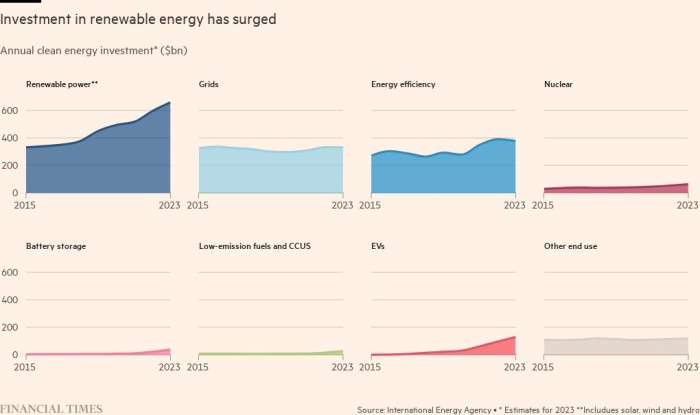Solar power investment is set to outstrip spending on oil production this year for the first time, the head of the International Energy Agency has said, highlighting a surge in clean energy development that will help curb global emissions if the trend persists.
“If these clean energy investments continue to grow in line with what we have seen in the past few years . . . we will soon start to see a very different energy system emerging and we can keep the 1.5C goal alive,” Fatih Birol, executive director of the IEA, told the Financial Times, in reference to the Paris Agreement target to limit the global temperature rise.
This year $1.7tn is forecast to be spent on clean technologies compared with $1tn on fossil fuels. Five years ago, the $2tn in annual energy investment was split evenly between fossil fuels and clean technology, such as renewables, electric vehicles and low-emissions fuels.
Birol said a “new global clean energy economy is emerging”, adding: “For a man like me who makes his hands dirty with data every single day this is a striking, dramatic shift.”
The increased spending on clean energy is being driven by a strong rebound in economic growth following the Covid-19 pandemic, as well as concerns about price volatility and energy security sparked by Russia’s full-scale invasion of Ukraine last year, according to the IEA’s annual World Energy Investment report, published on Thursday.
Enhanced policy support such as the US Inflation Reduction Act, which has provided $369bn of subsidies and tax credits for clean energy technologies, has also helped, the report said.
As a result, the IEA expects annual clean energy investment to jump by 24 per cent compared with 2021, while spending on fossil fuels will rise by 15 per cent, it added.
Solar power was the “star of global energy investments” with total spending expected to top $1bn a day, exceeding spending on oil production, said Birol.

The IEA chief attended the recent G7 summit in Japan and said he was encouraged by the level of alignment on energy matters between G7 members and invited countries such as Brazil, India and Indonesia. “I had rarely seen such a homogeneous view of the future of energy markets,” he added.
But to maintain the momentum G7 leaders needed to ensure that current spending on clean energy was broadened to more emerging and developing countries, said Birol. “If there is one challenge it is whether or not the emerging countries will be able to finance their clean energy transition alone,” he added.
Despite the boom in clean energy spending, global energy-related carbon emissions grew 0.9 per cent last year to a record 36.8bn tonnes, the IEA said in March.
Birol also called on national and international oil companies to direct more of their spending towards low-carbon energy solutions. Total investment by the oil and gas industry on low-emissions sources of energy is less than 5 per cent of the total spent on fossil fuel production, according to IEA analysis.
“I hope that there is more of a parallel between what the heads of the international and national oil companies say about their concerns about climate change and what they do in terms of their investment,” said Birol.
Credit: Source link















